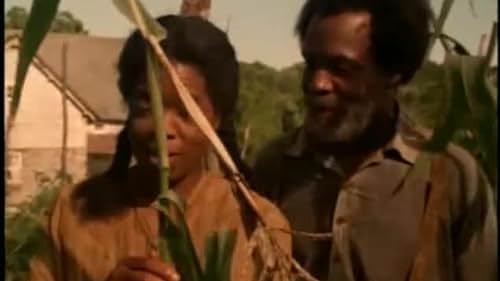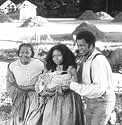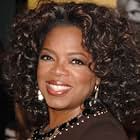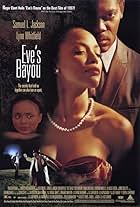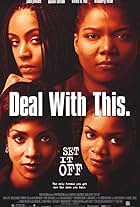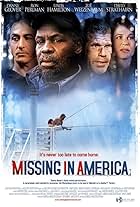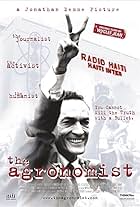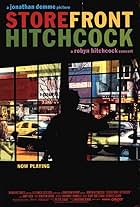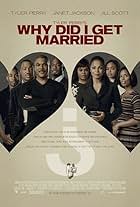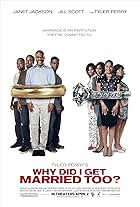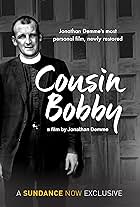IMDb RATING
6.1/10
9.7K
YOUR RATING
A slave is visited by the spirit of a mysterious young woman.A slave is visited by the spirit of a mysterious young woman.A slave is visited by the spirit of a mysterious young woman.
- Nominated for 1 Oscar
- 3 wins & 24 nominations total
Kessia Embry
- Amy Denver
- (as Kessia Kordelle)
LisaGay Hamilton
- Younger Sethe
- (as Lisa Gay Hamilton)
Thandiwe Newton
- Beloved
- (as Thandie Newton)
Storyline
Did you know
- TriviaThandiwe Newton's African first name means, interestingly enough, "beloved."
- GoofsIn the scene with a deer in the field, a car is visible driving by in the upper right hand corner.
- Quotes
Baby Suggs: And the beat, beat, of your heart... Love it. More than the lungs that need yet to breathe free air. More than the womb, which holds life. More than the private parts that give life. Love your heart. This... this is the prize. Amen. This the prize... Amen!
- Crazy creditsIn lieu of traditional opening credits, the movie begins with the camera moving through a cemetery to focus on a gravestone engraved with the sole word "BELOVED".
- Alternate versionsIn the version aired on television there is a deleted scene and two alternate scenes. The TV version also removes any mention of Sethe's sons. They don't exist in the TV version. The first alternate scene is when Paul D is telling Sethe about Halle being in the loft. In the theatrical you see Paul D quoting Halle. In the TV version there is a flashback to Halle (Hill Harper) saying "The loft." The second alternate scene in the prayer group discussing how to deal with Sethe being haunted by Beloved. In the theatrical there is a line about Sethe being like batter. In the Tv version that is removed and there is a line inserted from another woman saying "I don't mind a little communication between worlds but this is invasion" and another character says "we better get to work and pray" The deleted scene added for the TV version has Stamp Paid asking Paul D if beloved is his problem and not what Sethe did.
Featured review
Beloved is a novel that relies heavily upon it's own language and the brilliant writing style in order to have its effect on the reader. One of its strongest points (and these are countless) is that it is about the period of American history near the end and immediately following slavery, when Negroes were still considered sub-human. It presents the story of the tremendous suffering of a few slaves during that time (and, indeed, during their entire lives), but the important thing is that the book does this with a startlingly small amount of graphic images and direct depictions of violence or cruelty. Because the movie is a visual account of the novel, it is unable to do this.
Sethe is a former slave who has suffered more hardships than most human beings (although, given the allusions to life on Sweet Home, she has not suffered even there the most), and the novel is about her life experiences and those of the slaves close to her. The most glaring problem here, which may have been unavoidable, is that Sethe's flashbacks could not be presented in the film in any other way than as brief, shocking images filled with violence and blood. This is not a problem because of anything to do with gratuitous violence, but because in the novel, Sethe lets out brief snapshots of her memories (which are too painful to directly tell as stories of her earlier life) as though she does not quite realize that she's doing it, then immediately stops herself when the pain hits her. The magnitude of her suffering is reduced to split-second sequences of brutality, which are presented as such but with no explanation or hint that they are that short because they are too painful to be any longer.
Besides the trouble that arises from having huge Hollywood superstars play the slaves here (which is a negligible fact because the performances are so powerful), the performance of Beloved, the title character, is entirely off the mark. Beloved embodies the epitome of Sethe's painful memories. She is Sethe's daughter (although not the only child) that Sethe was forced to kill to prevent them from going into slavery (thus providing the most significant act that allows us, indeed, FORCES us, to judge her as a person). When she is reborn from the river, she stumbles to 124 Bluestone Road, the house in which the majority of the movie and novel take place, and back into the lives of Sethe and Denver, the daughter that barely escaped the violence of her own mother's hands.
The problem with the performance is that, while it's true that Beloved was killed when she was two years old, and has not matured a day since then except physically, she does not act like a two-year-old child. The Beloved in Toni Morrison's novel has the maturity of a two-year-old and the physical, motherly needs of a two-year-old (most evident in her urgent need to be with Sethe), but she does not have the demeanor of one. I am reminded of John Malkovich's performance as Lennie Small in `Of Mice and Men.' Lennie Small is a huge, hulking man in the novel with a miniscule intelligence. He has the intellectual capacity and maybe even some of the same values as a seven or eight-year-old (such as `tenning dem wabbits'), but he doesn't act like one. Thandie Newton remembers in her performance that Beloved was a small child when she died, but she overuses it to the point where she drowns out much of the rest of the effect that she has on the story and those around her. Most importantly, her overdone performance distracts attention from the purpose that she is meant to serve in the story.
Beloved is the supernatural element of Toni Morrison's novel, who is there not because this is a supernatural story but because she represents the magnitude of the suffering that went on during slave times. She is a spiritual manifestation that requires no explanation except for her cause of death, and Newton's outlandish performance in the role reduces that effect because her behavior is not explained.
The film stays true to the magnitude of sorrow presented in the novel, but it transforms it from the slow, relentless, and immensely complicated version presented in the novel and into one of visuals and performance, which challenges successful actors to present the lives of people who have suffered more than most people alive can imagine. The film succeeds grandly in presenting the society in which Negroes were not humans but property. Sethe did not murder her children, she destroyed property that does not belong to her. But the important thing that is lost here is the shock that is delivered by the subtlety of the content. The emotion of the novel is enormously powerful, and yet it is all so subdued that even white people are almost not in it at all. They are little more than a lumbering presence that never shows its face (except for the single scene in the book that is presented from the point of view of white people), but is always looming dangerously just over the horizon. Beloved is a story that is too powerful to be told directly, because if it is, it will be weakened because the danger and the suffering becomes tangible, something that you can see and then forget about. The short descriptions and bits of events in the book force the mind to circle and work them until the full impact of their true meaning is realized.
Sethe is a former slave who has suffered more hardships than most human beings (although, given the allusions to life on Sweet Home, she has not suffered even there the most), and the novel is about her life experiences and those of the slaves close to her. The most glaring problem here, which may have been unavoidable, is that Sethe's flashbacks could not be presented in the film in any other way than as brief, shocking images filled with violence and blood. This is not a problem because of anything to do with gratuitous violence, but because in the novel, Sethe lets out brief snapshots of her memories (which are too painful to directly tell as stories of her earlier life) as though she does not quite realize that she's doing it, then immediately stops herself when the pain hits her. The magnitude of her suffering is reduced to split-second sequences of brutality, which are presented as such but with no explanation or hint that they are that short because they are too painful to be any longer.
Besides the trouble that arises from having huge Hollywood superstars play the slaves here (which is a negligible fact because the performances are so powerful), the performance of Beloved, the title character, is entirely off the mark. Beloved embodies the epitome of Sethe's painful memories. She is Sethe's daughter (although not the only child) that Sethe was forced to kill to prevent them from going into slavery (thus providing the most significant act that allows us, indeed, FORCES us, to judge her as a person). When she is reborn from the river, she stumbles to 124 Bluestone Road, the house in which the majority of the movie and novel take place, and back into the lives of Sethe and Denver, the daughter that barely escaped the violence of her own mother's hands.
The problem with the performance is that, while it's true that Beloved was killed when she was two years old, and has not matured a day since then except physically, she does not act like a two-year-old child. The Beloved in Toni Morrison's novel has the maturity of a two-year-old and the physical, motherly needs of a two-year-old (most evident in her urgent need to be with Sethe), but she does not have the demeanor of one. I am reminded of John Malkovich's performance as Lennie Small in `Of Mice and Men.' Lennie Small is a huge, hulking man in the novel with a miniscule intelligence. He has the intellectual capacity and maybe even some of the same values as a seven or eight-year-old (such as `tenning dem wabbits'), but he doesn't act like one. Thandie Newton remembers in her performance that Beloved was a small child when she died, but she overuses it to the point where she drowns out much of the rest of the effect that she has on the story and those around her. Most importantly, her overdone performance distracts attention from the purpose that she is meant to serve in the story.
Beloved is the supernatural element of Toni Morrison's novel, who is there not because this is a supernatural story but because she represents the magnitude of the suffering that went on during slave times. She is a spiritual manifestation that requires no explanation except for her cause of death, and Newton's outlandish performance in the role reduces that effect because her behavior is not explained.
The film stays true to the magnitude of sorrow presented in the novel, but it transforms it from the slow, relentless, and immensely complicated version presented in the novel and into one of visuals and performance, which challenges successful actors to present the lives of people who have suffered more than most people alive can imagine. The film succeeds grandly in presenting the society in which Negroes were not humans but property. Sethe did not murder her children, she destroyed property that does not belong to her. But the important thing that is lost here is the shock that is delivered by the subtlety of the content. The emotion of the novel is enormously powerful, and yet it is all so subdued that even white people are almost not in it at all. They are little more than a lumbering presence that never shows its face (except for the single scene in the book that is presented from the point of view of white people), but is always looming dangerously just over the horizon. Beloved is a story that is too powerful to be told directly, because if it is, it will be weakened because the danger and the suffering becomes tangible, something that you can see and then forget about. The short descriptions and bits of events in the book force the mind to circle and work them until the full impact of their true meaning is realized.
- Anonymous_Maxine
- Mar 13, 2003
- Permalink
Details
Box office
- Budget
- $80,000,000 (estimated)
- Gross US & Canada
- $22,852,487
- Opening weekend US & Canada
- $8,165,551
- Oct 18, 1998
- Gross worldwide
- $22,852,487
- Runtime2 hours 52 minutes
- Color
- Sound mix
- Aspect ratio
- 1.85 : 1
Contribute to this page
Suggest an edit or add missing content


